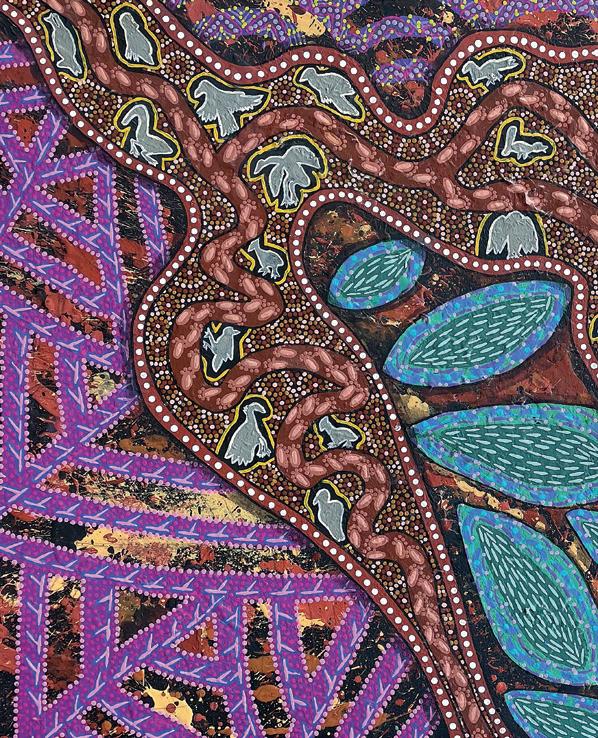
Annual Report 2021/22



Annual Report 2021/22

The Royal Flying Doctor Service (Queensland Section) is dedicated to providing vital healthcare to everyone, no matter where they live, work, or travel.
Providing a mantle of safety for people in the bush has been the organisation’s mission since the very beginning of the service in 1928. Nearly 100 years on, the Flying Doctor has expanded from aeromedical retrievals to also provide inter-facility transfers, primary health care clinics, mental health consultations and oral health services.
The Flying Doctor’s iconic emergency retrieval service operates 24 hours a day, seven days a week. Regardless of the time, or location, when someone needs life-saving care, the Flying Doctor is there. In the past year, more than 12,000 patients were flown via the RFDS aeromedical service.
Providing the finest care to the furthest corners of Queensland, the Flying Doctor is an instrumental part of regional, rural, and remote communities with more than 3,000 GP and Nurse clinics that support more than 35,000 people each year. Expanding this service into virtual health helps more than 17,000 callers each year who may otherwise be isolated from healthcare when they need it.
The RFDS Medical Chest – and the Flying Doctor on the other end of the phone – is a crucial part of life for people in rural and remote parts of Queensland. With more than 1,200 Medical Chests across Queensland, the Flying Doctor ensures people have access to the best care where and when they need.
To provide further support to regional, rural, and remote Queenslanders, the Flying Doctor is continually expanding its services. In the past year, mental health clinicians provided more than 12,200 mental health consultations with people across the state. The Dental Services team provided more than 1,600 consultations in 17 different communities in the past year.
The RFDS operates nine bases throughout Queensland including Brisbane, Bundaberg, Cairns, Charleville, Longreach, Mount Isa, Rockhampton, Roma, and Townsville. These bases form a strategic network and help deliver the finest care to the furthest corners of the state.
The RFDS (Queensland Section) receives Commonwealth Government and State Government funding to operate its services while also relying on commercial ventures, bequests, fundraising, donations, and partnerships to support operational costs and fund capital campaigns including the replacement of aircraft, the back-ofcabin fit-out, investment in infrastructure at its bases, the purchase of medical equipment, and other major capital investments. A new commercial venture this year was the acquisition of Rescue Swag, a first aid kit now endorsed by RFDS doctors, with profits supporting the delivery of services across Queensland.
Our cover artist
On the cover and throughout the pages of the Annual Report 2021/22 are elements of Wudarabin Snider’s artwork titled, Lores
The teen artist previously created the winning design in an Indigenous Creative Art Competition, with her artwork featuring on the cover of the 2020/21 RFDS (Queensland Section) Financial Report and Annual Report. When designing her most recent artwork for the RFDS (Queensland Section), Wudarabin focused on the values, or lores, of the RFDS.


Wudarabin explained:
The firesticks represent mutual care and respect. Our people would make a fire to show their respect when passing through neighbouring clans’ territory and for smoking ceremonies to show care for their wellbeing.
The large shields represent the theme safety and quality as the shields were used by our people for protection. They were quality shields to provide safety.
The clapsticks were used around the fire to sing songs, and share stories, as a community together, in a collaborative environment.
The huts symbolise the safety and shelter we had in an open and transparent environment.
The boomerangs represent the value of commercially astute, as a person has to be very sharp and clear to be able to throw a boomerang and make it return.
The birds represent the pilots, doctors, and nurses, being proud and passionate as they fly high in the sky like the planes.
There is also surrounding Bama (Aboriginal) dot art, which shows my pride and passion in my culture, especially the white dots which represent my bubu (country) Laura and the ancient cave art.
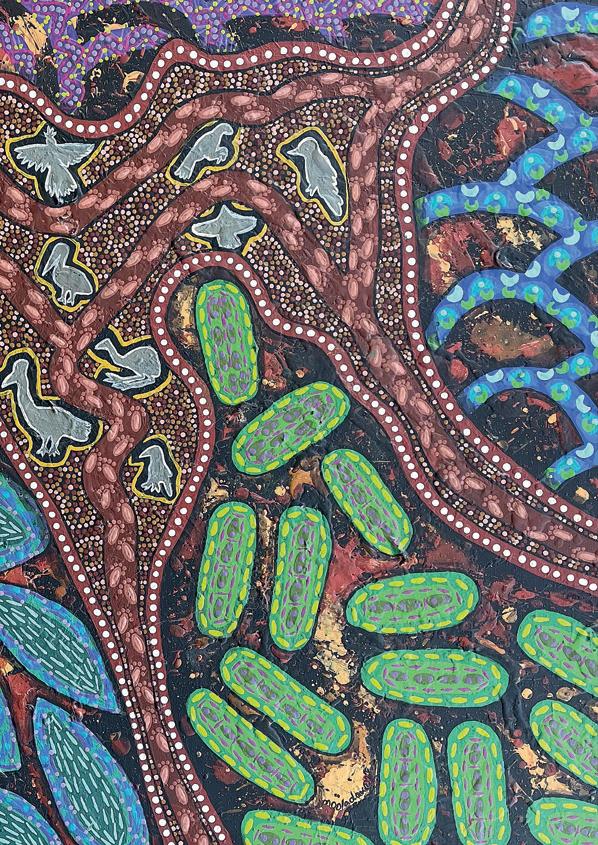
RUSSELL POSTLE – CHAIR
The Royal Flying Doctor Service (Queensland Section) Annual Report 2021/22 highlights the achievements of our organisation, acknowledges the unwavering commitment of our supporters and partners, and honours the dedication and commitment of the RFDS (Queensland Section) team.
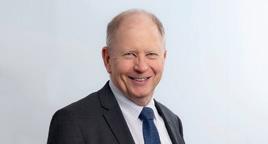
While the ongoing effects of the COVID-19 pandemic continued to have an impact on our organisation and the communities we serve, the RFDS (Queensland Section) continued to provide vital emergency retrieval and primary health care services to regional, rural and remote communities all over Queensland.
The signing of a 10-year partnership between the RFDS (Queensland Section) and the Queensland Government has allowed for an improved and expanded inter-facility transfer service. I would like to congratulate Chief Executive Officer Meredith Staib, the Executive Leadership Team, and the broader team for their foresight and commitment to secure this partnership, and for the tremendous amount of work that has happened – and continues to happen – to ensure the RFDS (Queensland Section) can provide the finest care to all areas of the state.
It is rewarding to see the services continue to grow – including telehealth, which allows rural and remote community members to remain connected to health care despite the tyranny of distance.
The number of GP and nurse clinics have also grown, while the number of people the RFDS (Queensland Section) helps each year also increases. It is heartwarming to know that the Flying Doctor is always there for people who live, work, and travel in regional, rural, and remote Queensland.
Thank you to our partners for their unwavering support of the RFDS (Queensland Section) over many years. On behalf of the Board, I want to show our appreciation to Ergon Energy Retail, QCoal, Brisbane Airport Corporation, Woolworths, and Rio Tinto for their muchneeded funds and support to keep our aircraft in the skies and our staff able to deliver the finest care to the furthest corner.
On behalf of the Board, I also thank our community of supporters — Commonwealth and State governments, corporate partners, special advisors and contractors, and the community of fundraisers — for your ongoing provision of the RFDS in Queensland.
To our people, our team – our doctors, nurses, pilots, engineers, and support staff – I thank you for your professionalism and commitment to the communities in which you work. Upholding the values of the RFDS in everything you do, you remain dedicated and devoted to improving health outcomes for people in regional, rural, and remote communities of Queensland.
I also thank my fellow Board members for their wise counsel as stewards of our organisation, and the leadership of our Chief Executive Officer, Meredith Staib. This collective effort, and shared purpose, places us in an ideal situation as we continue to expand our services and help even more people through primary health care and aeromedical services across Queensland.
Russell Postle Chair RFDS (Queensland Section)
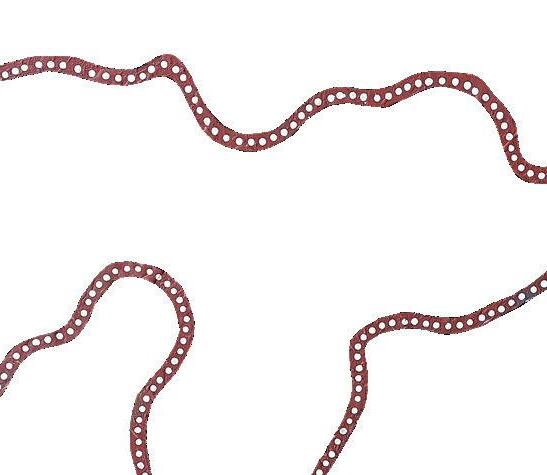
back of cabin to our patients.
The 2021/22 year also brought many opportunities to reflect and celebrate our proud history – notably the 50th anniversary of the Cairns Base. Half a century ago, the base was opened to better help people in Far North Queensland. Today, Cairns is one the biggest RFDS bases in Australia. The aeromedical retrievals, primary health care clinics, mental health services, and health promotion activities happening every day is testament to the passion and commitment of the team, and I want to congratulate the Cairns Base – past and present –for their steadfast passion and commitment.
innovative first aid kit that was founded and designed in outback Queensland. This not only ensures an income stream for the organisation to continue delivering our services, but provides yet another way the RFDS can help people remain safe regardless of where they live, work, or travel.
We remain committed to our long-term strategic goals, and are preparing for the next five-year strategy that will take us to 100 years of operation. I want to thank our supporters and partners for their ongoing commitment that ensures our organisation will be here for the community for the next 100 years and beyond.
Meredith Staib Chief Executive Officer RFDS (Queensland Section)
The RFDS continues to provide vital emergency medical and primary health care services to regional, rural, and remote communities across Queensland.
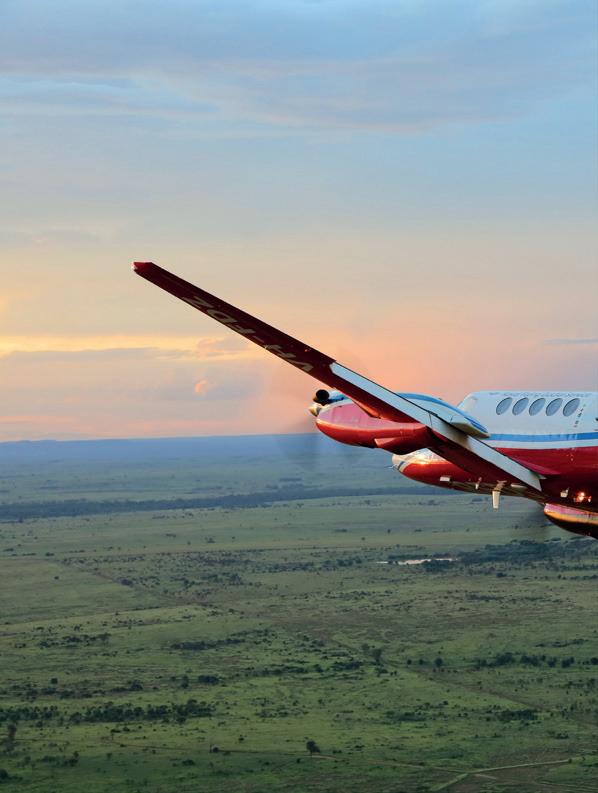
MORE THAN 240
MORE THAN 10,700
MORE THAN 12,200 1,200 occasions of care across Queensland each day immunisations administered consultations by headspace Cairns and RFDS mental health clinicians
medical chests in rural and remote locations throughout Queensland
MORE THAN 12,000 MORE THAN 35,000 MORE THAN 17,000 MORE THAN 1,600
patients flown via RFDS aeromedical service
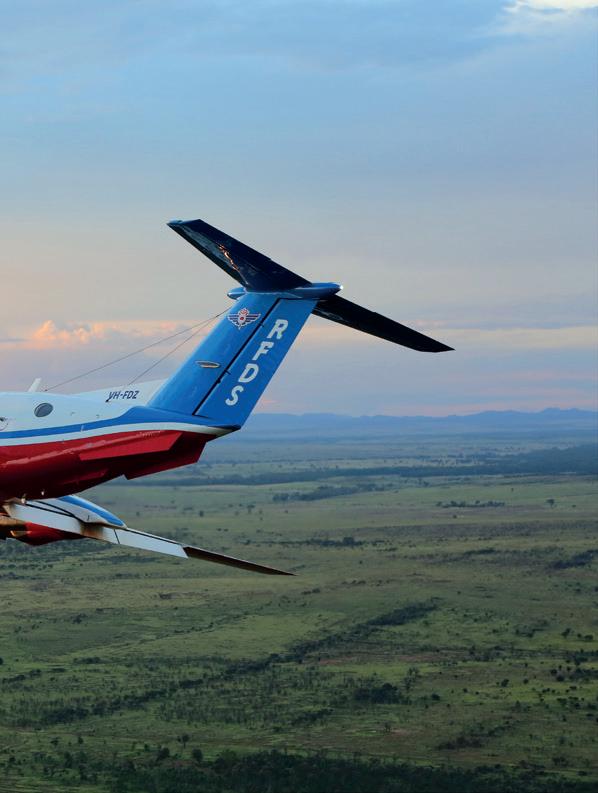
patients attended RFDS GP and nurse clinics in Queensland
remote consultation calls through RFDS telehealth service consultations by the RFDS Dental Service team
NIGEL ALEXANDER – RFDS FOUNDATION CHAIR
FY 2021/22 was another example of the unwavering commitment of our supporters to work with us to improve health outcomes for people in regional, rural, and remote communities.
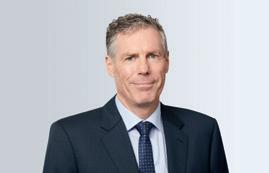
The generosity of so many people enables the Royal Flying Doctor Service (Queensland Section) to deliver the life-saving primary health care and aeromedical services to communities all over the state.
Since its inception in 2018, the RFDS Foundation has focused on investing in the future. The Flying Doctor has a proud nearly 100 year history, and our aim is to ensure the services continue to help those who rely on the Flying Doctor for another 100 years and beyond. Through careful management of invested funds and bequests, the RFDS Foundation’s mission is to promote, safeguard, and improve the health of people in regional, rural, and remote Queensland.
Generous support from the community allows the Foundation to support the RFDS (Queensland Section) to deliver on its promise to deliver the finest care to the furthest corner through:
• Investment in primary health care services and extension of existing primary health care
• Investment in aircraft and infrastructure that leads to better health outcomes for people in regional, rural, and remote locations
• Innovation through new technology and service delivery platforms
• Ongoing professional development of RFDS clinicians to support high-quality patient care and the recruitment and retention of staff.
Contributions to the RFDS Foundation have made a considerable impact to people in regional, rural, and remote Queensland communities – including investment in infrastructure projects across the state and investment in the new Beechcraft King Air B360 aircraft.
It has been incredible to watch the fit-out of the new B360 over the past year – providing a world-class back-of-cabin for patients, and improved flying capability and efficiency. This would not be possible without the generous support of our donors and people who choose to leave a lasting legacy through a gift in their Will.
Another important investment is the investment in our people. Through the RFDS Foundation, engineering apprentices are supported to forge their careers with the Flying Doctor – working on world-class aircraft and keeping our healthcare clinicians and patients safe.
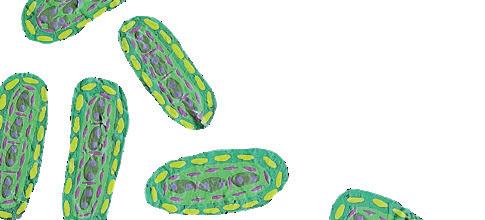
I would like to send my sincerest appreciation to our devoted supporters who are unwavering in their support of the Flying Doctor and the mission to provide the finest care to the furthest corner.
I extend my gratitude to my fellow directors for their wise counsel in governing the RFDS Foundation, and to the RFDS Board and staff for their dedication to the people who live, work, or travel in regional, rural, and remote communities in Queensland.
Nigel Alexander Chair RFDS Foundation
Along with the rest of the world, the RFDS mourned the loss of Queen Elizabeth II, the person who bestowed the Royal charter upon our organisation and continued her deep connection with the Flying Doctor for her 70 years of service.
The young Queen broadcasting a message over the Flying Doctor’s wireless and speaking with a mother on a remote property in 1954 became an iconic image – reinforcing the Queen’s deep love and respect for people in the outback.
“Your fortitude, your courage, your humour, and your friendliness, and of the magnificent way in which you have overcome the problems of living in this region of vast distances and great loneliness,” the Queen shared in her message.
“My only regret is that my husband and I cannot visit some of you on your stations and in your homesteads.”
In response, a young mother, Mrs Mitchell, from Muloorina, Lake Eyre told the Queen: “I am speaking from a wireless transceiver 300 miles from your
Majesty at Broken Hill. We have one child. My family is very isolated, our nearest settlement is 35 miles away.”
When bestowing the Royal charter on the Flying Doctor Service in 1954, just two years after she came to the throne, the Queen paid tribute to the dedicated doctors, nurses, pilots, and support staff.
“I have heard so much of the work of the Flying Doctor Service and the security and comfort it brings to every part of the outback. I would like to take this opportunity of paying a tribute to its founder, the Reverend John Flynn, and of expressing my admiration for those, past and present, who have contributed to its splendid work,” the Queen said during her visit.

The Queen’s connection with the Flying Doctor continued for her entire life, also sharing that passion with her children and grandchildren.
Queen Elizabeth II and her husband Prince Phillip visited RFDS Bases on their visits to Queensland – Mount Isa in 1970 and Cairns in 2002 and spoke of her admiration and respect for people from the bush, and the importance of continuing Reverend John Flynn’s vision.
RFDS (Queensland Section) Chair Russell Postle honoured the Queen and reflected on her passion and commitment for helping others –much like the RFDS.
“As we remember Her Majesty, we should take inspiration from her and give thanks for the remarkable contribution she made throughout her historic reign, including her kind support of the Royal Flying Doctor Service,” he said.
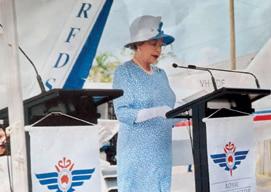
On 1 July 1972, the RFDS moved its Charters Towers Base to Cairns to better serve the communities in the far north of the state. Celebrating 50 years in 2022, the Cairns base is now one of the largest RFDS operations across all of Australia.
Reflecting on the 50 years of the RFDS Cairns Base, Chief Executive Officer Meredith Staib thanked the community of supporters, past and current employees who dedicated their lives to the communities they serve, and for the local communities who have so passionately supported and advocated for the services in Cairns and the wider community.
“Over the past half-century, RFDS teams have conducted countless life-saving retrievals, delivered babies, provided vital primary health care services, and even hosted members of the
royal family, including the Queen, Prince Charles (now King), and Prince William,” Ms Staib recalls.
Mike Lacey, who was the Cairns Base Manager for more than 28 years, remembers the transformation of the Base and its services.
“When I first started, the prime reason for the RFDS was aeromedical retrievals and clinics, and now Cairns has expanded so much to include primary health care, mental health education, and health promotion, so it’s become a holistic health organisation,” he says.
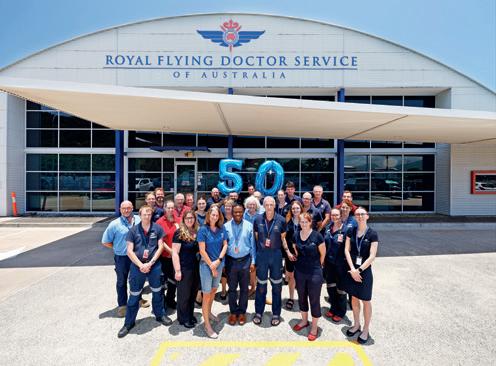
On 1 July 1972, after growing demand from its base in Charters Towers, and with many of the patients in need of care located further north, the RFDS moved the base to Cairns.
In the first month, the new Cairns Base assisted more than 600 patients – via emergency retrievals, clinics and radio consultations.
When the Cairns Base first opened, there were eight staff – including two doctors, a pilot, a base director, two radio officers and two administration staff – and a Beechcraft twin engine Queenair A80 aircraft. The first female Flying Doctor pilot, Captain Beth Garrett, was part of the crew that travelled to some of the most remote locations in Queensland, including the
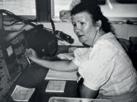
northernmost tip of Cape York to retrieve people who were critically ill and deliver primary health care. Today, the Cairns Base is home to four aircraft and more than 100 staff. In the 2021/22 financial year alone, RFDS Cairns Base teams transferred more than 1,200 patients, conducted more than 2,000 primary health care clinics, and in partnership with headspace Cairns held close to 2,250 mental health service clinics.
From the early days of flying 12,000km in the first month, the crews now travel more than 100,000 km each month to provide care to communities in Far North Queensland.
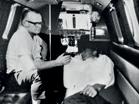
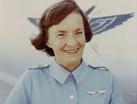
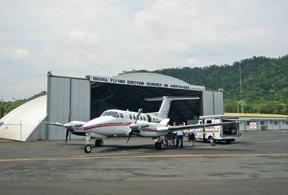
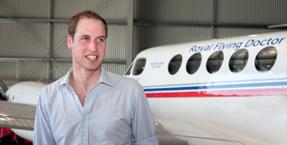
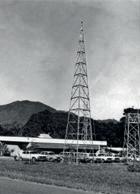
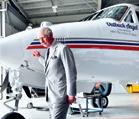
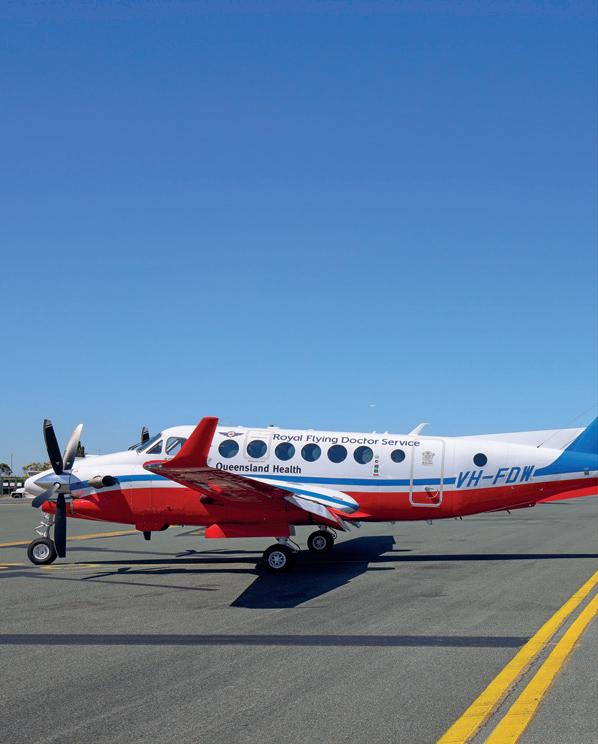
In June 2022, Queensland Health committed an additional $334 million over the next 10 years to expand and enhance the RFDS’ service delivery across Queensland.
The agreement strengthened the long-standing partnership with the Queensland Government and ensured the RFDS network of nine bases across the state continue to provide the finest care to every corner of Queensland.
“Since the signing of the agreement, substantial work has been completed to establish a dedicated aeromedical service in Charleville –allowing the RFDS to better care for the people living and working in the west,” Chief Executive Officer Meredith Staib says.
The dedicated teams on the ground – and in the air – have transformed operational practices to further enhance the capacity and responsiveness of the RFDS across Queensland.
Retrieval Services Queensland Executive Director Dr Mark Elcock says improving the equity of access to specialist heath care for patients and communities is a shared vision of Retrieval Services Queensland and RFDS.
“We have worked hard together, investing in a new 10-year agreement with new aircraft and enhanced services that will ensure that RFDS continues to provide the backbone to the Queensland Health Aeromedical Network, providing safe, quality, reliable and responsive aeromedical support, 24 hours a day, irrespective of where you need help in our large state,” Dr Elcock says.
It means greater accessibility of more services for more people living, working and travelling in every corner of our 1.73 million square kilometre service area.
“This 10-year partnership highlights our fundamental role and the incredible trust the Queensland Government has in the RFDS to provide the services we do. The ongoing commitment from the Queensland Government also provides confidence to the community that we will continue to be there in their time of need, now and well into the future.”
Meredith Staib
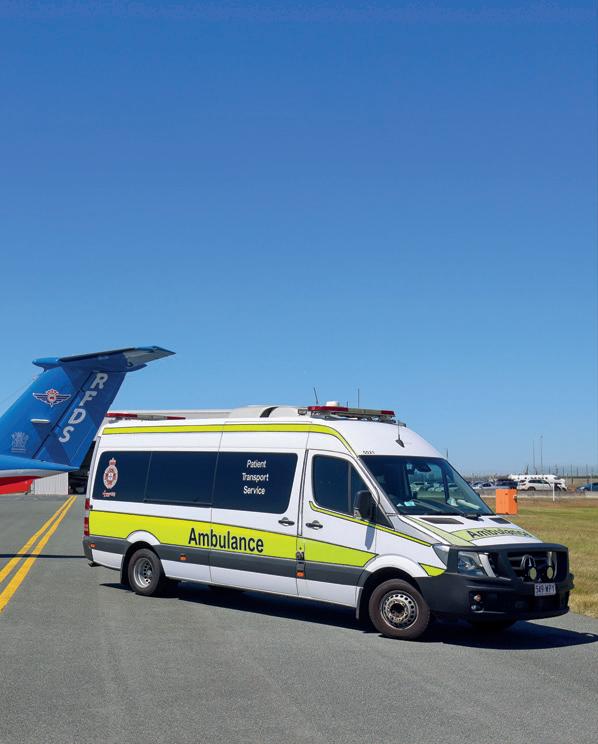
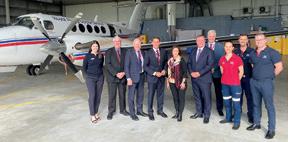
The first of seven Beechcraft King Air B360 to join the RFDS fleet has undergone a state-of-the-art fit-out to transform the back of cabin into a flying intensive care unit.
Since the aircraft arrived in Brisbane in December 2021, a team of dedicated RFDS staff have worked on designing the best possible environment for patients, including an integrated stretcher system that will seamlessly connect with Queensland Ambulance Service (QAS) road vehicles.
The additional aircraft will enhance the RFDS’ inter-facility transfer service that is delivered in partnership with the Queensland Government to transfer patients between hospitals to receive the best possible care when and where they need it.
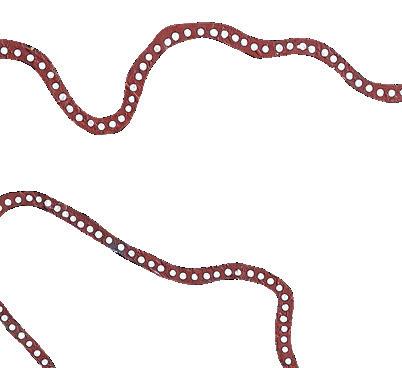
Nurse Manager Aeromedical Training and Clinical Resources Maree Cummins has been a Flight Nurse for more than 30 years and says patient care is always at the forefront, while also reducing the manual load on staff.
“The back of the cabin has been specially customised to make use of every inch of space and create an intensive care unit in the sky,” Ms Cummins says.
“The innovative stretcher system, which integrates seamlessly with Queensland Ambulance Service stretchers, is also a first-of-its-kind for fixed-wing aircraft in Queensland and will make it quicker and easier to transfer patients on and off the aircraft.
“An integrated cabin concept includes a connected control system which will allow Flight Nurses and Doctors to monitor medical battery, oxygen capacity and flow rates, and control cabin lighting, while remaining seated.”
State Aeromedical Lead Dr Jacob O’Gorman says he is proud of the innovation and technology that will “modernise how patients are transferred throughout Queensland, which will also increase safety and improve efficiencies for the patients and the crews”.
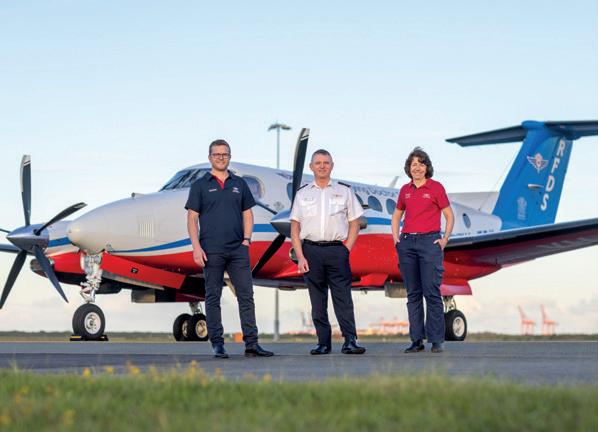

To take a tour inside the B360, scan the QR code.
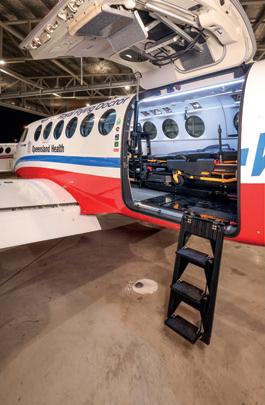
“The integrated stretcher system means that we can transfer a patient from an intensive care unit in Hervey Bay for example, through to the Royal Brisbane & Women’s Hospital Intensive Care Unit and they would stay on that same stretcher for that entire journey.”
Head of Flying Operations Shane Lawrey explains the new B360 will join the existing fleet of aircraft, which travelled more than 8 million kilometres across Queensland in the 2021/22 year.
“The B360 aircraft will be the fastest twin turboprop aeromedical King Air aircraft in the country,” Mr Lawrey says.
“Along with reducing pilot workload, the upgraded engines, five bladed composite propellers and anti-skid braking system will enhance aircraft performance and efficiency – allowing our crews to fly further and faster to reach patients.
“The back of the cabin has been specially customised to make use of every inch of space and create an intensive care unit in the sky,”
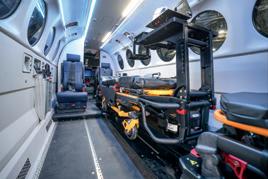
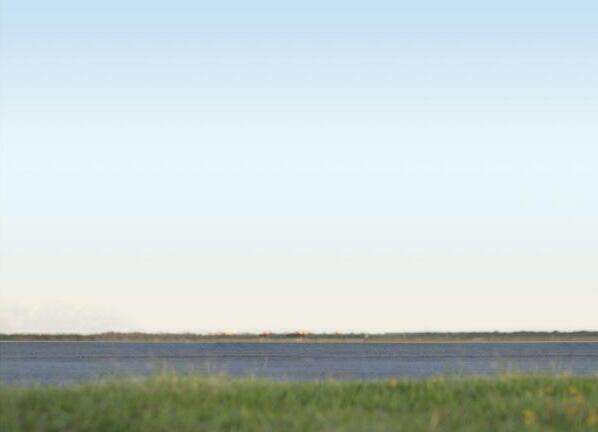
“Advancements in the cockpit, such as the digital pressurisation controller, will also increase the overall comfort for patients during a flight.”
Chief Executive Officer Meredith Staib explains the first B360, which will become operational in late 2022, is a key part of the organisation’s 10-year aircraft replacement strategy.
Ms Staib thanks Queensland Health, donors, fundraisers, and partners for the support towards this project. The next aircraft is currently undergoing its fit-out while the remaining aircraft will be ferried to Australia over the next 18 months.
The Beechcraft King Air 360 is designed and manufactured by Textron Aviation in the United States and was fitted out by Sunshine Coast company HeliMods.
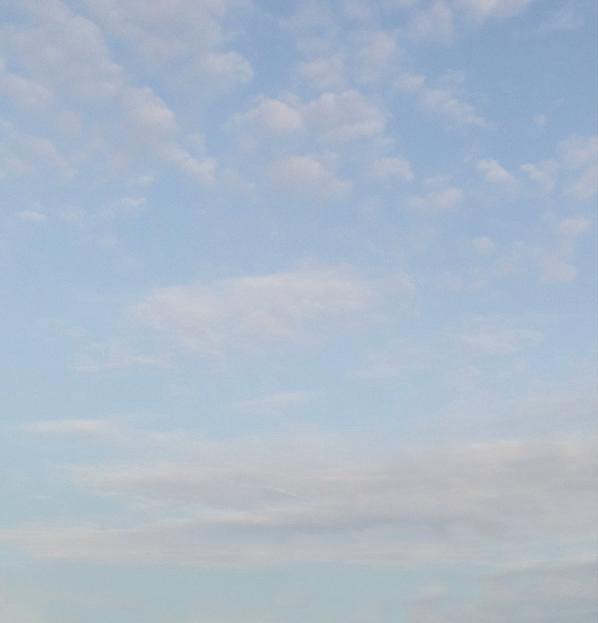
The addition of the new Beechcraft King Air B360 aircraft takes the fleet to 21 aeromedical aircraft servicing Queensland.
King Air B200 and B200C
Number in fleet: 16
Maximum altitude: 35,000ft
Maximum speed: 278 knots (515kph)
Range: 2,700km
Cabin dimensions: 1.38m wide, 6.7m long, 1.46m high
King Air B350CHW
Number in fleet: 4
Maximum altitude: 35,000ft
Maximum speed: 305 knots (565 kph)
Range: 3,000km
Cabin dimensions: 1.38m wide, 7.56m long, 1.46m high
King Air B360
Number in fleet: 1
Maximum altitude: 35,000ft
Maximum speed: 325 knots (602 kph)
Range: 3,000km
Cabin dimensions: 1.38m wide, 7.56m long, 1.46m high
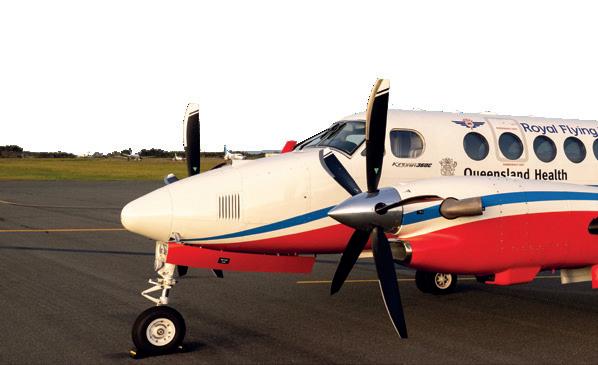

VH-FDR B200 2004
VH-VQD B200 2004
VH-FDZ B200 2004
VH-VOQ B200 2007
VH-VAQ B200 2007
VH-FDT B200 2007
VH-FDG B200 2009
VH-FDI B200C 2010
VH-FDS B200C 2010
VH-FDM B200C 2010
VH-FDL B200 2014
VH-FDO B200 2014 Cooee – named by Ergon Energy Retail
VH-FDN B350 2014
VH-FDC B350 2016 Ray Grace
VH-FDF B350 2015
VH-FDD B350 2017
VH-VJW B200 2006
VH-VJX B200 2006 Bevan Jibson
VH-VJY B200 2006
VH-VJZ B200 2006 Geoffrey Carrick
VH-FDW B360 2021 Charles and Cornelia Goode
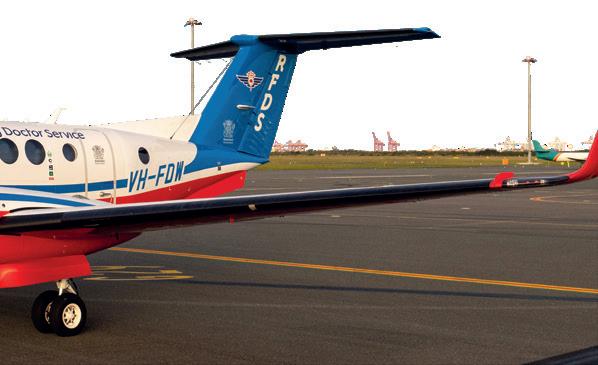

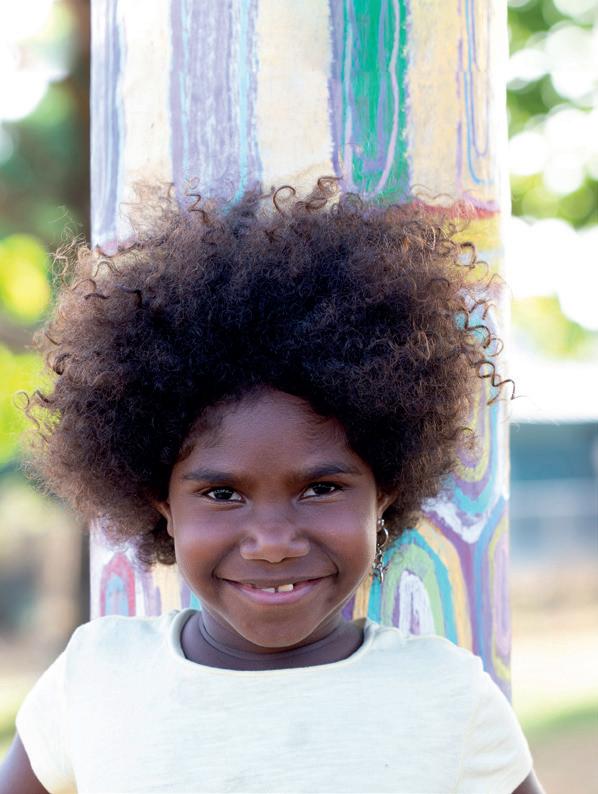
“When I grow up I want to be a Flying Doctor.”
The heartwarming words from seven-year-old Dakota Short about becoming a Flying Doctor one day show the importance of RFDS primary health clinics, and the special connection between the RFDS, patients and the community.
“The nurses let me play with the thermometers, stethoscopes and machines,” Dakota shares with a beaming smile. “They are teaching me how to be a nurse one day. One day I will work with the Royal Flying Doctor Service and help people, just like they help my family.”
Inspired by the dedicated health professionals who visit Lockhart River every fortnight, Dakota is just one of many lives changed by the RFDS’ primary health care clinics.
Dakota’s mum, Greta Accoom, explains simply: “The RFDS is an integral part of our community”.
“They keep us healthy, and they bring this incredible healthcare to us here in our community. It means we don’t have to leave the community and our family,” Greta shares.
“The RFDS not only visits us for health clinics, they do so much work in the community, in partnership with the community, educating our kids about healthy choices and looking after their health.”
“They
are teaching me how to be a nurse one day. One day I will work with the Royal Flying Doctor Service and help people, just like they help my family.”
Dakota Short, 7
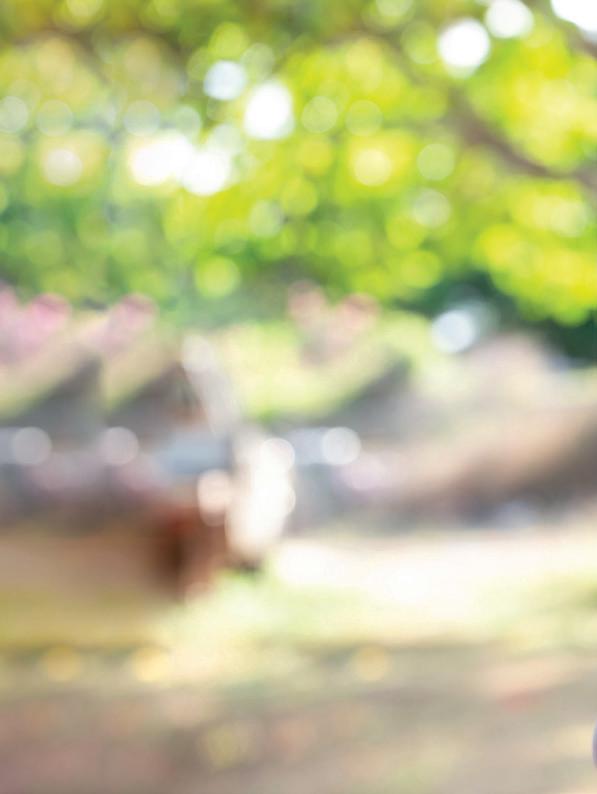
Greta has never known life in Lockhart without the RFDS. Something she is extremely grateful for every day, but especially so in emergencies.
“Dakota has three older siblings – Simone, 22, Celeste, 20, and Shapel, 17. They have all been looked after by the RFDS with regular health checks.

“My father, my aunty, and my grandmother and grandad have all been flown by the RFDS over the years. I’m just so grateful that we have the Royal Flying Doctor Service as a part of our community, because we are really remote. If someone is sick, it is very comforting knowing the Flying Doctor is here to help.”
Greta shares her appreciation for the community of supporters who donate to the RFDS.
“I’ve seen other communities in different areas who do not have the access to doctors and nurses or the medicine we do. They are forced to leave their community and their family – or go without – and that can be very isolating for them to be away from their family. The difference it makes having the Flying Doctor in our community is very special and important.”
In the 2021/22 financial year, the RFDS delivered more than 3,000 primary health care clinics across the state to 65 rural and remote communities.
STAFF PROFILE | NERIDAH KING – PRIMARY HEALTH CARE NURSE , MOUNT ISA BASE
Nurse Neridah King swapped the grape-lined Barossa for Mount Isa with one goal – to improve health outcomes in outback Queensland.
Neridah explains people living in rural and remote areas can often struggle with self-managing their chronic illnesses due to limited resources or access to GPs. That’s what has inspired her decade-long career as a primary health care nurse, and the reason behind her joining the RFDS just over a year ago.
“My role is to help these individuals move from reactive health care into proactive treatment plans,” Neridah says.
As a PHC nurse, Neridah specialises in chronic disease management, focusing on chronic obstructive pulmonary diseases (emphysema, chronic bronchitis and in some cases asthma).

While based out of Mount Isa, Neridah flies to different rural and remote communities and clinics across Queensland up to three times a week.
“Believe it or not, I was terrified of flying before starting my role with the Flying Doctor,” Neridah shares.
“There was a moment two weeks in that I questioned if I was capable of flying so regularly. But, after getting to know the amazing locals within the communities I was travelling to – many of who rely on RFDS as their only regular source of health care – my fears started to go away.”
“I have no worries about flying now and instead cherish the moments when I can enjoy the beautiful landscape as part of the journey. Plus, RFDS pilots are incredible and would always put me at ease during the early weeks.”
Before starting with the RFDS, Neridah had never experienced regional life quite like outback Queensland.
“At first, I was shocked to see the extent of how restricted some services are in remote areas. There are communities so remote their GP service is only available every two weeks.
I quickly learned of the scope of services rolled out by the RFDS to bridge this gap, such as the Medical Chests that are available to isolated families and communities to treat medical conditions with a doctor or healthcare provider always available on the other end of the phone.”
“Oh, and nothing can prepare you for the heat!”
In her first few months with the RFDS, Neridah played a vital role in the roll-out of COVID-19 vaccines across rural and regional Queensland – a service that was essential to protecting vulnerable communities during peak pandemic periods.
“By getting that face time with so many locals across a short period, I was able to talk to them about other ways we can support their healthcare needs and answer their questions on the spot. The trust journey was fast-tracked in a sense.”
Neridah says working for the RFDS is the best experience of her life so far, personally and professionally. But, the most rewarding part is giving back to Queenslanders every day.

“I am inspired each and every day by the communities I visit and the team I work with as part of the RFDS. I can’t imagine leaving regional Queensland – I have truly fallen in love with the outback.”
The RFDS Medical Chest program started in 1942 as a way to give people access to medication and medical supplies when they are hundreds of kilometres from a pharmacy or medical facility. After 80 years, there are now more than 1,200 Medical Chests on rural and remote properties across Queensland.
The Tully family have had an RFDS Medical Chest on their property for three generations.
It’s the “safety net” Joe and Stacey say they rely on as they raise their three boys on the same property Joe grew up on. Joe doesn’t know life without a Medical Chest – it was there when his grandparents lived and worked on the property, and then his parents when they took over.
“We’ve used it a few times, thankfully for nothing too serious. But just knowing the Medical Chest is there and that we can call the Flying Doctor at any time of day or night, is such a comfort to our family,” Joe explains.
“I loved my childhood, and that’s the childhood we wanted to give our boys.”
Living on a remote property – about 220km from Quilpie – provides an idyllic lifestyle for the young boys – Mack, 4, Ned, 2, and Jake, six months –but also comes with some challenges.
Stacey says having the Medical Chest nearby, and a doctor at the other end of the phone, provides her family reassurance to know if something goes wrong, help is there.
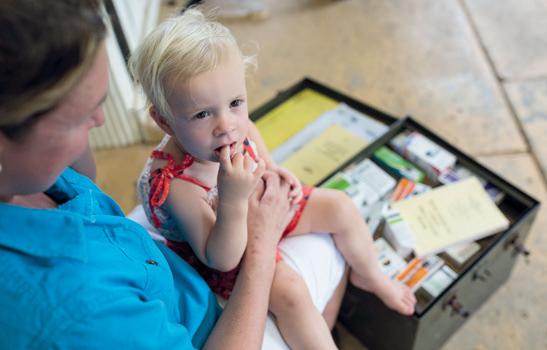
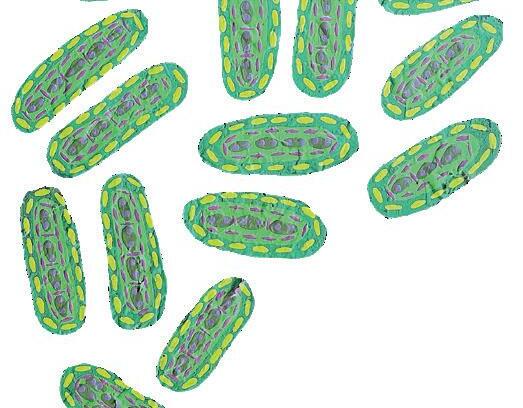
“The Medical Chest is that safety net for us. We have the RFDS doctors and nurses at the Health Clinic once a fortnight as well, and we know the Flying Doctor will be here in the aircraft for emergencies.”
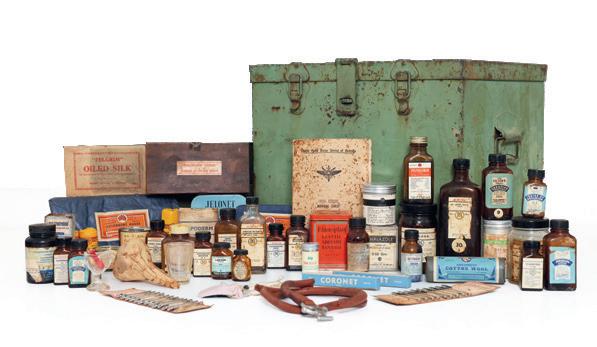
“Especially since having the boys, I would be a lot more nervous as a parent if we didn’t have the Medical Chest,” Stacey explains. I know that if one of the children have a temperature, I can call the doctor and know what we are doing is correct. The doctor can prescribe antibiotics if we need it, there’s an Epipen if we were ever to need it, there’s everything you could think of for a whole lot of different circumstances, and that is extremely reassuring for us.”
Medical Chest holders go through training to be able to use the contents if and when they need. They know to call the Flying Doctor and a doctor will talk them through every step.
It’s a similar story Kirsty Cobb and her family on a remote property in Far North Queensland, two and a half hours’ drive from their nearest hospital in Mareeba.
“We have been managing the station for eight years, but the Medical Chest has been here a lot longer than that,” Kirsty says.
“We use the Medical Chest at least a couple of times every year. Just recently, there was an accident on the outstation and we needed to use the morphine.
“If we didn’t have the medication here in the Medical Chest, and the Flying Doctor to talk to over the phone then that person would have been in a lot more pain until emergency care arrived.
“Having the Medical Chest is a safety net for us being so far away. We are 80km from a health clinic and more than two-and-a-half hours from our closest hospital. It would be worrying without the Medical Chest, and the Flying Doctor on the phone.
“We are very grateful for both the Medical Chest and the RFDS.”
EMMA JACKSON
Emma Jackson was crowned the 2022 RFDS Local Hero after she saved the life of her friend on a remote cattle station.
The annual RFDS Local Hero Awards, supported by Ergon Energy Retail, recognise Queenslanders who have gone above and beyond to support their community. In 2022, inspiring RFDS Local Heroes were named from eight regions across the state, before communities voted for the Queensland Hero – Emma.
Emma lives with her family on Wolverton Station in the Archer River region of Cape York. She is the founder of Conquer the Corrugations – an initiative which aims to raise awareness for mental health and suicide prevention in the remote region – and is also a dedicated sustainability advocate.
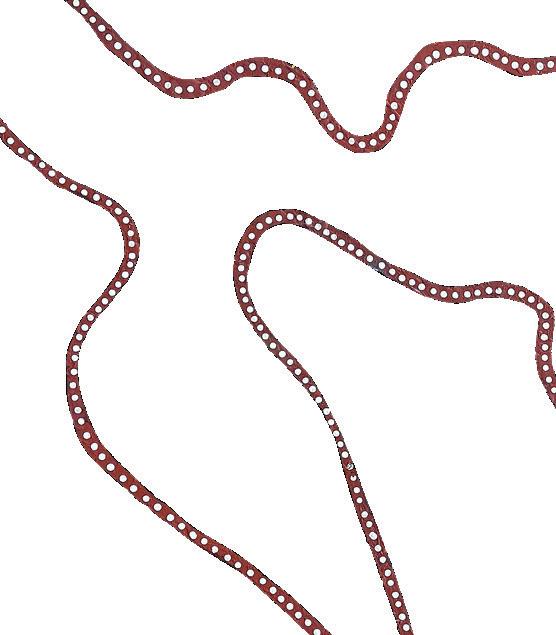
Emma’s determination to help others also saw her save the life of her friend Karryn, who suffered a ‘widow-maker’ heart attack when she visited Wolverton Station late last year.
RFDS (Queensland Section) Chief Executive Officer Meredith Staib congratulates Emma on receiving the 2022 RFDS Queensland Local Hero Award.
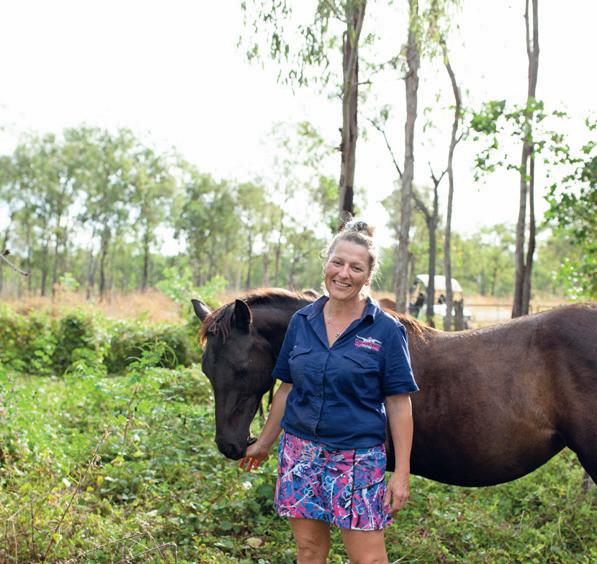
“Emma’s bravery and never-give-up spirit, along with her dedication to her community is truly inspiring,” Ms Staib says.
“Delivering healthcare and supporting communities is a team effort, which is why we are so incredibly grateful to have people like Emma and all of our Local Heroes on the ground each and every day.”
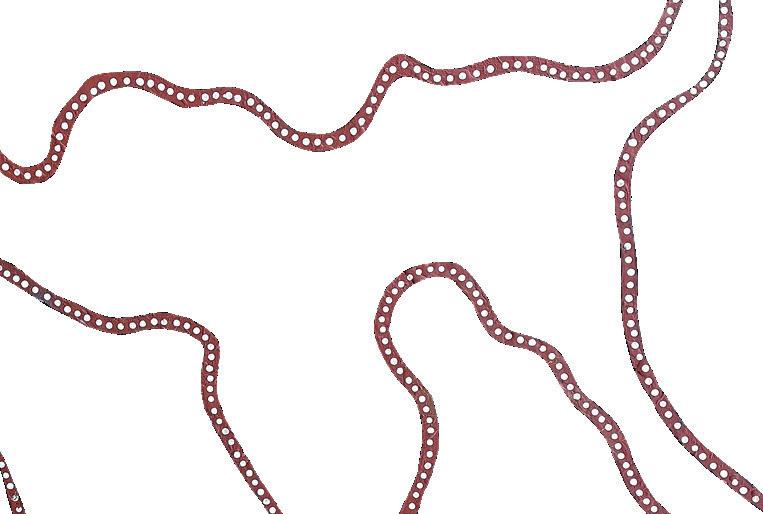
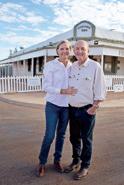
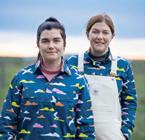
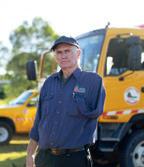

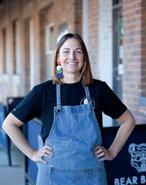
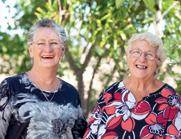
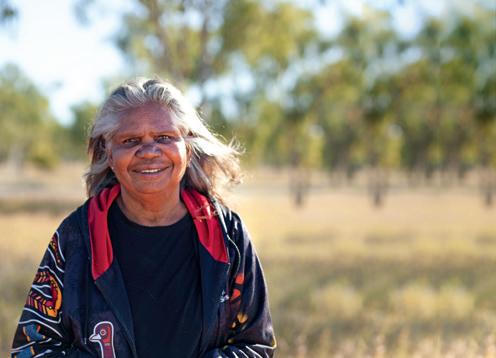
PATIENT PROFILE | JESS HARVEY, WESTERN QUEENSLAND
Jess Harvey was 35 weeks pregnant when she awoke in the middle of the night with contractions.
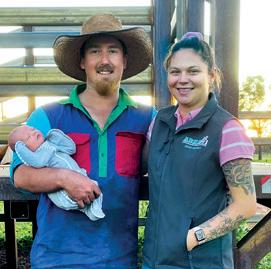
The only problem was, she was at home on a remote station two hours from Richmond — the nearest town — more than 500 kilometres from her nearest tertiary hospital, and 270 kilometres away from her partner Sam, who was at a mustering camp.
“I called my mum and just cried; this wasn’t how I planned it,” Jess recalls.
Friends on the property drove Jess two hours to the health service in town, as her contractions got closer and closer together.
As there were no midwives stationed at the health service, the Royal Flying Doctor Service (Queensland Section) crew at the Mount Isa Base received an early morning call from Retrieval Services Queensland to assist.
The team of three including a doctor, a flight nurse who is also a midwife, and pilot, touched down in Richmond a short time later.
“They were unreal, I cannot thank them enough. If it wasn’t for them, I don’t know what I would’ve done,”
RFDS Doctor Shima Ghedia said it was a privilege to assist in the delivery of Darby, the first baby to be born at the health service in Richmond in 15 years.
“Jess was an absolute trooper; Sam was there to support and cut the cord, our Flight Nurse Leanne Ashbacher was incredible, and even our pilot got involved,” Dr Shima recalls.
“The local staff at the health centre were also overjoyed.”
Jess, cradling her little baby in her arms, says she cannot thank the RFDS enough for delivering Darby safely into the world.
“They were unreal, I cannot thank them enough. If it wasn’t for them, I don’t know what I would’ve done,” Jess says.
Jess and baby Darby were flown by the RFDS crew to Townsville for further care before they returned home to their property.
Doctor Shima said when the team finally touched back down in Mount Isa, there was yet another reason to celebrate that day, with RFDS Pilot Michael Flood hitting his milestone of 10,000 flight hours.
“Michael has been flying for more than 22 years and has worked with the Flying Doctor for many years, so this was a wonderful achievement,” she says.
“I’m so proud of the whole team and this was certainly a day all involved won’t forget any time soon.”
RFDS operates as part of the Queensland Health aeromedical network.
STAFF PROFILE | GRACE HOLLOWAY – FLIGHT NURSE, TOWNSVILLE BASE
Grace Holloway was working as an Emergency Department nurse in Brisbane when the opportunity of a lifetime came up to join the Flying Doctor. A midwifery scholarship from the Royal Flying Doctor Service (Queensland Section) encouraged Grace to follow her dream to become a Flight Nurse.
The RFDS Foundation funds a number of scholarships each year for skilled Registered Nurses to further develop their skills and obtain a midwifery qualification. Last year, Grace was one of those nurses, who successfully applied for a scholarship and is now working as a Flight Nurse based in Townsville.
“I absolutely loved the RFDS and the support they provide for regional, rural, and remote communities, including the Indigenous communities,” Grace shares. “That’s why I thought I would apply for the scholarship, but I had no expectation of being successful because I know how many nurses have the same dream I did – to work for the RFDS.
“The people who live in these regional, rural, and remote communities have so much trust in and respect for the RFDS. They are so happy to see us when we land, and it is a really special feeling to know we are able to help them.”
When working in the Emergency Department, Grace had limited exposure to Indigenous
healthcare but knew it was an area of healthcare she wanted to pursue. It is a passion that has only developed in her time working with the RFDS, in particular Indigenous women’s health.
“Being able to help women feel comfortable with health professionals is a really special feeling. Midwifery is not only about helping women when pregnant, but also post-natal care which is extremely important.
“I have used my midwifery skills quite a lot already. I’ve helped pregnant women from Bamaga at the northern tip of Cape York, Weipa, and Cairns when they have gone into spontaneous prelabour or had complications with their pregnancy. This can be the scariest time of their lives, and it is a real privilege to be able to help them through this time and bring their beautiful babies safely into the world.
“What is really special is being able to follow up with some of these pregnant women at the clinics and continue post-natal care, whether that is help with breastfeeding, helping them
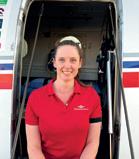
recover from birth including caring for caesarian scars, and then looking after the children as they grow up.”
State Manager of Aeromedical Nursing Jacinta Jones says the midwifery scholarships are part of the Flying Doctor’s commitment to improving the health of people in regional, rural, and remote communities by attracting skilled nurses to join the RFDS.
Thanks to the Dalara Foundation for supporting Grace’s scholarship.
From floods and cyclones to drought and fires, for many Queenslanders living in regional, rural and remote areas, natural disasters are a part of life.
We have made the promise to always be there for Queenslanders in their time of need – and that incorporates mental health and wellbeing services for people needing support during difficult times. An extension of our mental health services was born after the impact of the devasting bushfires throughout Queensland at the end of 2019.
In 2022, RFDS (Queensland Section) and Queensland Health supported the 12 regions most impacted by the 2019 bushfires, with Small Talk, Big Difference

In its second iteration, the first being in response to the historic monsoonal floods of 2019, Small Talk, Big Difference worked to equip people in these areas with the confidence to start a conversation about mental health and find the right support.
Outback Mental Health Clinical Lead Dr Tim Driscoll says the impact of natural disasters on affected people isn’t always obvious.
“There’s a lot of activity in the aftermath of a natural disaster – friends and family are checking in on you and you’re running on adrenaline in ‘repair’ mode. It’s normal to experience things like troubled sleep, feelings of agitation and being triggered by seemingly small things that may not have bothered you in the past but now feel uncomfortable,” he exlains.
“The immediate impact of these natural disasters is emotionally taxing for many and this usually fades over time. But for some people, the toll can be longlasting and may not present straight away – this is when having a small talk can make a big difference.”
Small Talk, Big Difference is a program delivered under joint funding by the Australian and Queensland governments under the Disaster Recovery Funding Arrangements (DRFA).
A number of online resources, community events, activations, and podcasts reached more than 1.3 million.
“As a community, we can band together, build our resilience and help support our neighbours in need, now and into the future – we just need to start having better small talk, asking more thought provoking questions than a simple ‘how are you?’ which can have a big difference to someone’s mental wellbeing,” Dr Driscoll adds.
RFDS delivered ‘Small Talk, Big Difference’ across Southern Downs, Lockyer Valley, Toowoomba, Ipswich, Somerset, Scenic Rim, Redland, Noosa, Sunshine Coast, Livingstone, Gladstone and Rockhampton.
The 10-year anniversary of headspace Cairns was celebrated in April 2022, serving as a meaningful opportunity to recognise the contribution that the team has provided to the region.
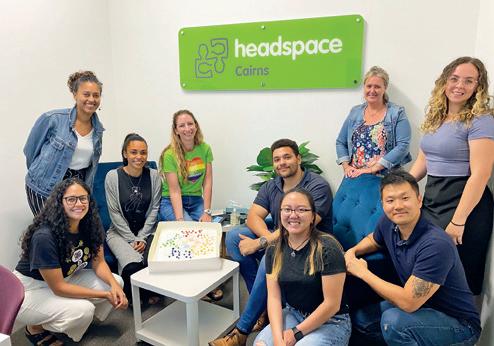
headspace Cairns is dedicated to supporting young people with mental health, physical health (including sexual health), alcohol and other drug services, as well as work and study support.
With a focus on early intervention, the organisation provides young people with support at a crucial time in their lives – helping many get back on track before potential issues escalate into lifelong problems.
Since launching in April 2012, headspace Cairns has provided positive mental health outcomes
to more than 7,000 young people and has delivered more than 50,000 episodes of care.
As well as providing a positive impact on these thousands of lives over the past decade, headspace Cairns has grown to become one of the busiest centres out of almost 150 throughout Australia.
Gabrielle is the manager of the team delivering the services locally – a team that has tripled in size in order to meet the continued community need for mental health services.
“We’re proud to be playing such a vital role in supporting so many young people across Cairns,” she says.
As the lead agency for headspace Cairns, the RFDS is proud to be part of this life-changing work. The significant collaboration between headspace Cairns and RFDS is an important part of the Flying Doctor’s commitment to delivering the finest mental health care to regional, rural and remote Queenslanders when they need it most.
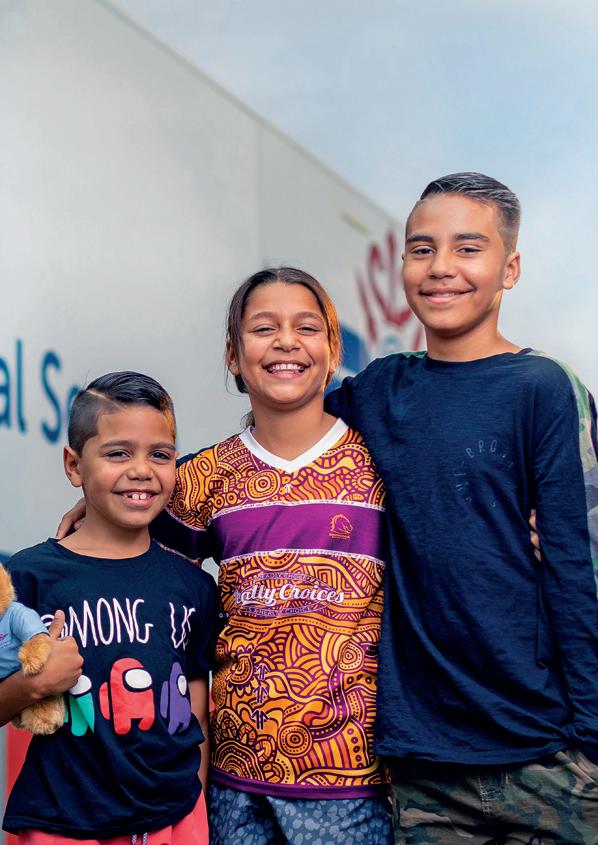
“In the past year, the team of RFDS Dentists and Dental Assistants visited 17 communities, including Mount Isa and Mornington Island for the first time.”
Stevie Dilley
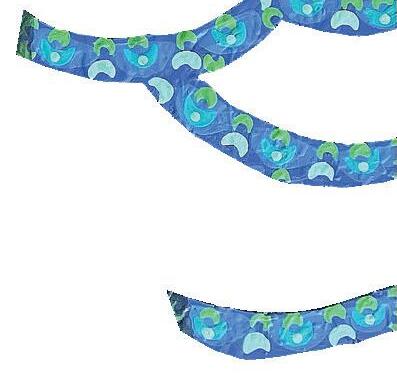
The smiles on the faces of children in rural and remote communities say it all – they are grateful for a visit from the RFDS Dental Service.
“Our patients have access to some of the best equipment available, including an OPG machine for X-rays. The qualified dentists and dental assistants can provide anything from a general checkup and clean, through to X-rays, extractions, treatment for gum disease and other conditions – it really is taking a dental surgery out to the communities who need it.”

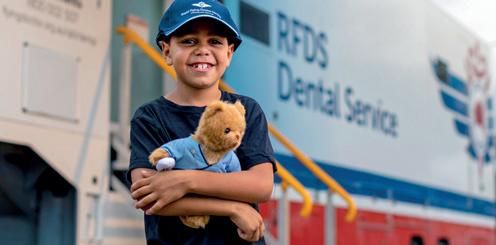

MUTUAL CARE AND RESPECT
COLLABORATIVE
PROUD AND PASSIONATE
CLINICS CONDUCTED
DENTAL CONSULTATIONS
COMMUNITIES SERVICED
”There
really is no better job in the world, or a better place to do that than in the Queensland outback.”

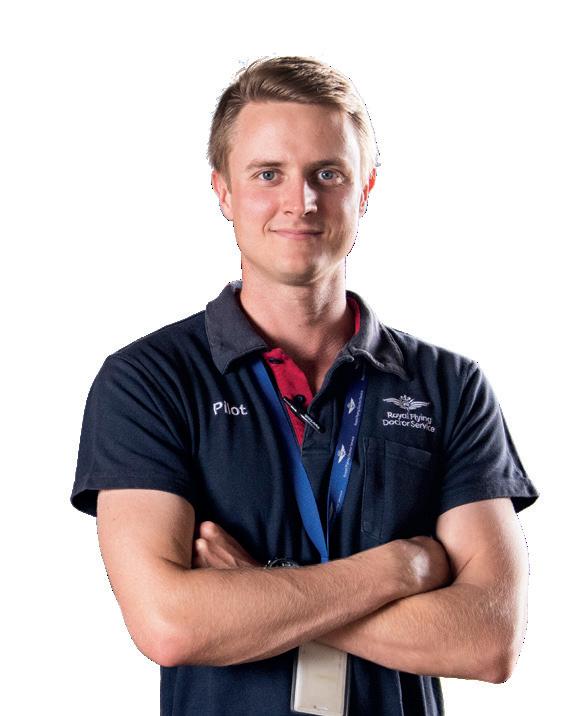

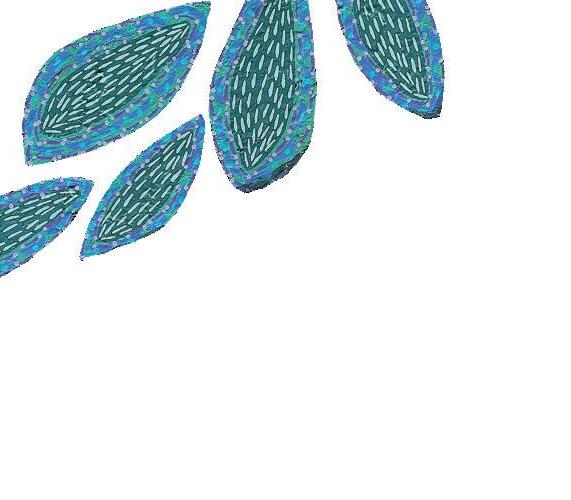
From his earliest experience learning to fly, Elliott Johnston had only one dream – to work for the Flying Doctor. Determination and commitment – and an enduring passion to help people – has led to a dream come true for Pilot, Elliott.
Where are you based?
Charleville. I feel extremely grateful to work in Charleville. The team I work with are incredibly dedicated, experienced and passionate. We are all friends outside of work and play volleyball or have dinner with each other and our families. The community of Charleville is incredibly supportive of the Flying Doctor and appreciative of the care we provide. I didn’t know much about Charleville before I started working here nearly three years ago, but I love it now and very much feel at home.
How old were you when you started flying?
It all began with remote control airplanes. One of the men involved in the club was a pilot for a major airline and was high up in CASA (Civil Aviation Safety Authority), and had a plane in the hangar behind the flying school and introduced me. I got my first licence when I was 15. It was so interesting, that 10 years later, the same man was then the instructor who gave me my accreditation that allowed me to fulfil my dream of working for the RFDS.
What was your motivation for wanting to be a pilot for the RFDS?
When I started flying, I knew that I wanted to work for the RFDS. Actually, that’s all I wanted to do. I knew I needed to get some experience, so I was flying up in the Northern Territory for a bit –in remote areas, using my problem-solving skills, working with VIPs and in the mining industry. Those experiences were incredible but the goal was always to work for the RFDS.
Why is working for the RFDS so special?
Where else would you fly somewhere and feel so appreciated? Working for the RFDS is about transporting doctors and nurses to help people, helping to connect rural and remote communities with healthcare services they might not otherwise have, and helping to save lives. There really is no better job in the world, or a better place to do that than in the Queensland outback.
What’s your best experience in your time with the RFDS?
Every time I fly with our doctors and nurses to help people is incredible. Every day is different and that’s what I really love about being a pilot with the RFDS. When I fly out to a clinic now with our team, I really love connecting with people in the community. It’s a really special feeling to form relationships with people in these remote areas and have the opportunity to see them each time we are in the community. A really special day for me was being able to show my mum through an RFDS aircraft –she was in awe of the back of cabin, describing it as ‘an ICU in the sky’.
What does the future hold for you?
I can honestly say I can’t see myself working anywhere else. No other pilot job would ever compare to the RFDS. I want to continue helping people, and would love to be involved in the future with teaching and training of pilots for the RFDS.
From my viewpoint




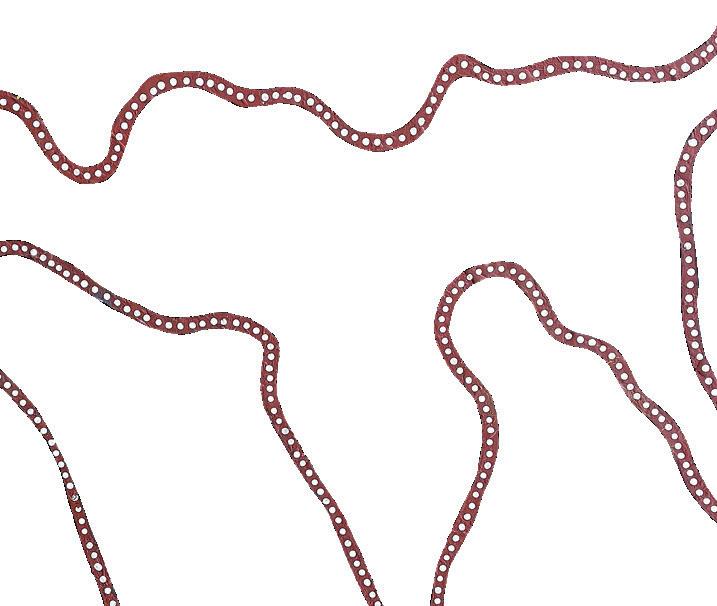
MUTUAL CARE AND RESPECT
MORE THAN 17,000
REMOTE CONSULTATION CALLS THROUGH OUR TELEHEALTH SERVICE
COLLABORATIVE
SAFETY AND QUALITY
MORE THAN
1,200
MEDICAL CHESTS ACROSS QUEENLAND
MORE THAN 1 100
EMERGENCY RETRIEVALS

When the Flying Doctor is needed in the middle of the night, the community rallies – lighting flares or in some situations resorting to lighting toilet paper in tin cans to help safely guide the RFDS aircraft into landing.
An innovative idea from long-serving RFDS pilot Nick Tully to provide lanterns to outback airstrips led to the launch of the Guiding Lights Appeal. The appeal asked the community to once again rally to help people in their time of need, and help our RFDS crews land safely when they are called upon.
An overwhelming response from the Queensland community has funded the first 30 sets of runway lanterns, which are currently being transported to rural and remote properties.
Nick Tully shares his gratitude for the community who supported the idea and generously donated the lanterns to help keep people in the outback safe.
“We often talk about the community behind the RFDS. As a pilot, doctor, or nurse, we cannot do our job without the community support – whether that is the people on remote properties maintaining the airstrips for us to land, lighting the runways at night, and the community of supporters who generously donate to help others,” Nick says.
“I always believed in the concept of these new lanterns that are easily maintained and can be seen from up to 30km away, but to see the overwhelming response and support from the community has really taken it to a whole new level.
“For the people living in rural and remote communities, they can sometimes feel isolated, especially in times of an emergency. The support the community has shown by funding these lanterns to keep them safe, shows these communities they are never alone. The RFDS is always there, but so is the wider community.”
The first 30 sets of lanterns from the Guiding Lights Appeal are being delivered to remote properties that have airstrips. The incredible support from donors ensures the Flying Doctor can continue to provide the finest care to the furthest corners of the state.
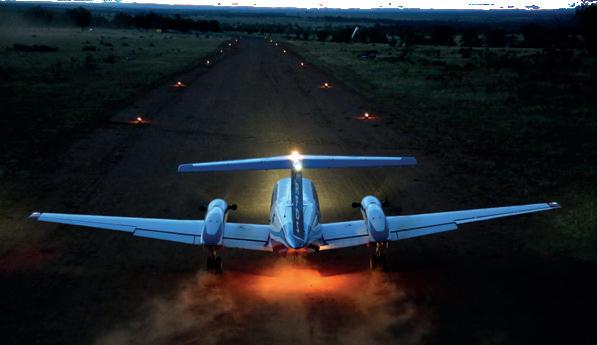
Safety and care have been at the forefront of the Flying Doctor’s mission from the very beginning in 1928. Close to 100 years on, Rescue Swag – an RFDS first aid kit, is ensuring the Flying Doctor continues keeping people safe no matter where they live, work, or travel.
Rescue Swag became part of the RFDS family in June 2022, with profits going back to the RFDS to enhance services in regional, rural, and remote Queensland. After making headlines on the TV show, Shark Tank Australia in 2015, the bright yellow first aid kit became the go-to first aid kit for all situations.
Dr Shaun Francis explains the importance of knowing basic first aid and travelling with a first aid kit.
“The difference it makes having a first aid kit on hand when you find yourself in an emergency can be the difference between life and death,” Dr Francis says.
“The difference it makes having a first aid kit on hand when you find yourself in an emergency can be the difference between life and death,”
Dr
Shaun Francis
“Even before RFDS was involved with Rescue Swag, I had purchased this first aid kit to keep my family safe when at home or travelling.
“I’m really proud that RFDS now has a first aid kit that people can buy, knowing it will help them in any situation they may find themselves in. Being prepared is essential, and a message we fully support.
“What is most pleasing is knowing that people are wanting to be prepared and keep themselves safe – with the peace of mind that the Flying Doctor is always there in an emergency.
“An added bonus is that people buying a Rescue Swag first aid kit are not only keeping themselves safe, but also help ensure people in regional, rural, and remote communities receive the healthcare they deserve.”
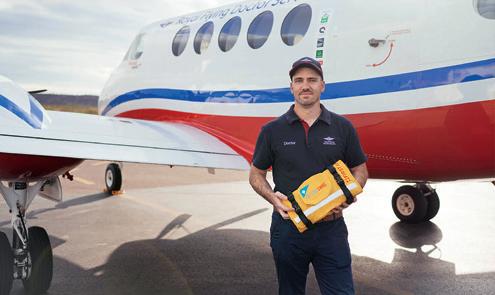
Explore the collection
Garvina is engineering a future to be proud of
STAFF PROFILE | GARVINA LUI – AIRCRAFT MAINTENANCE ENGINEER APPRENTICE
“It makes my heart full knowing I can play a part in ensuring everyone, no matter where they live, has access to the best possible healthcare.”
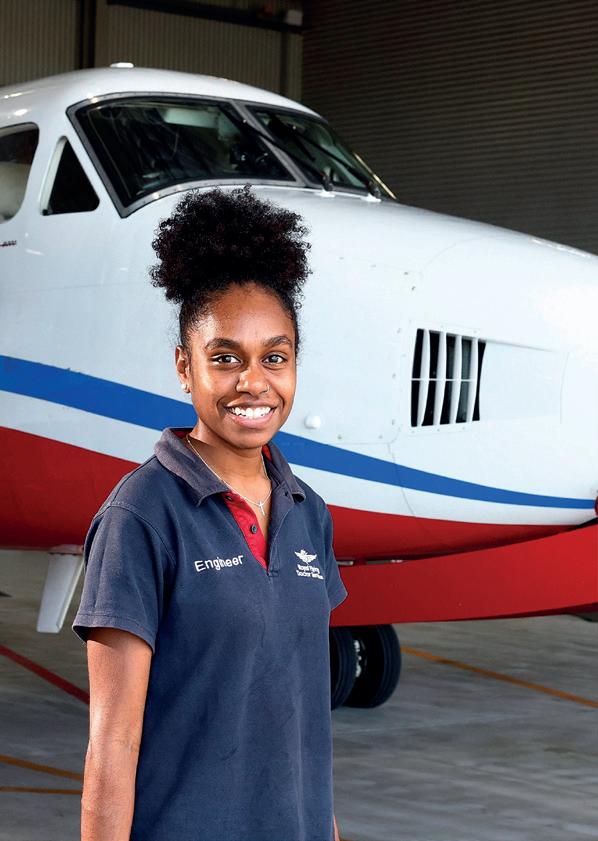
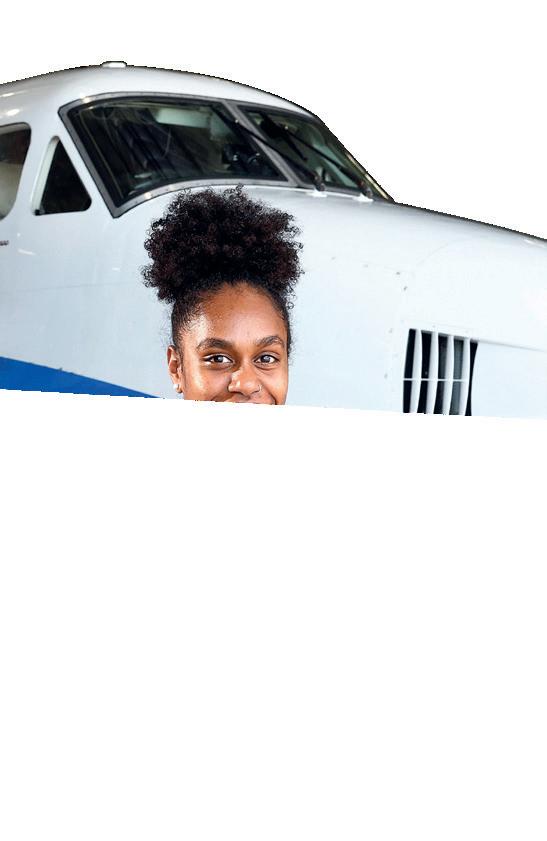
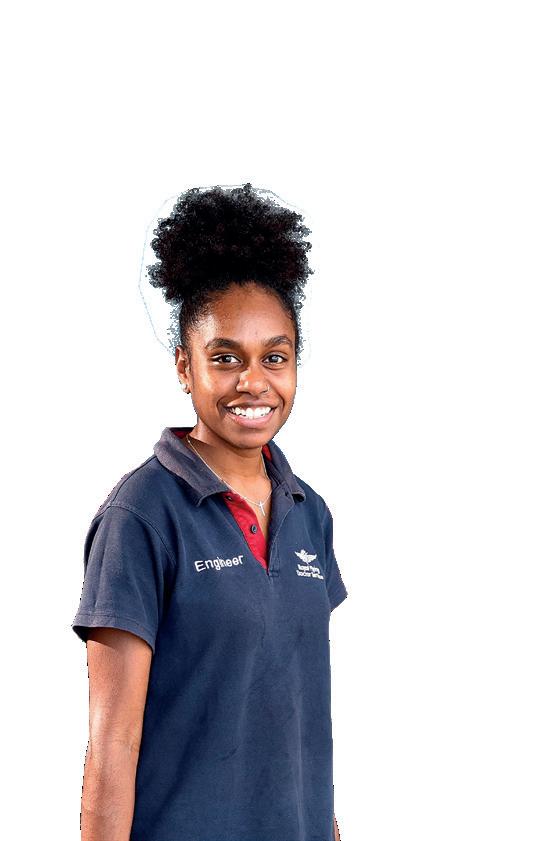
Garvina Lui is forging her career as an Aircraft Maintenance Engineer Apprentice based in Cairns – combining her passions for engineering and the ability to help people.
The 20-year-old had always wanted to study engineering but the COVID-19 pandemic stopped her planned move to Brisbane to study at Griffith University after graduating high school. Garvina changed her path and studied at a trade school, which then led to an apprenticeship with the RFDS Cairns Base this year.
“It has been really hands on,” Garvina says with a smile. With a busy hangar in the background, Garvina reflects on the first few months of her engineering apprenticeship which she hopes will lead to a life-long job working on RFDS aircraft.
“The first couple of months I was working on wheels. It’s incredible that today I am working on an engine and learning so much off everyone.”
Manager of Engineering Operations Adam Clegg praises Garvina’s attitude and work ethic.
“We are very excited to have Garvina in our Engineering team. Garvina has a great attitude, willingness to learn and is firmly part of the engineering team,” he says.
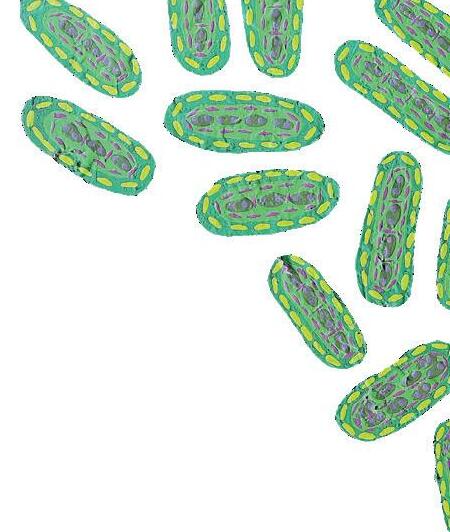
“We currently have an exceptional group of apprentices and we see this as part of our long term engineering sustainability plan.”
As a proud Torres Strait Islander woman, Garvina knows the importance of the Flying Doctor providing care to remote Indigenous communities.
“It was in my first couple of weeks of working here, a family member actually came in on an aircraft from Darnley Island,” Garvina recalls.
“Having the Flying Doctor for communities like this who don’t have much healthcare is so important. It makes my heart full knowing I can play a part in ensuring everyone, no matter where they live, has access to the best possible healthcare.
“It makes me really proud to work for the RFDS, especially when I see the young children coming through the Cairns Base and knowing they are getting the best care.”
There are 31 engineers, including five apprentices, working across RFDS (Queensland Section) –ensuring the highest quality of standards and safety for our crew and patients.
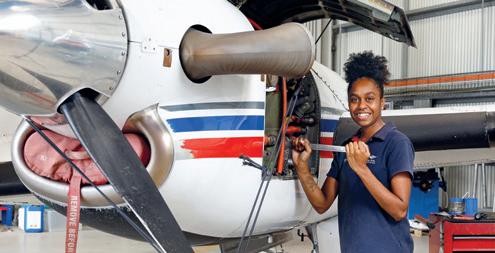
The RFDS’ focus is firmly on the future as we approach 100 years of operation in 2028 – ensuring that we have laid the foundations for continued excellence in patient care not just today or tomorrow, but 100 years from now.
Our ambitious infrastructure strategy continues to progress at pace, made possible thanks to the joint funding from all levels of government, corporate partners and public donations. Collectively, the Australian and Queensland governments have committed $86.6 million towards four core infrastructure projects.
In many respects, these projects are at the heart of our capability to enhance the provision of the finest care to the furthest corner by:
• Providing more advanced, fit-for-purpose treatment and transfer facilities
• Improving our training capabilities and facilities
• Creating more comfortable work environments for team members
• Facilitating greater accessibility of services, and range of services for more patients
• Delivering more seamless episodes of care through integrated stakeholder engagements
• Supporting advanced safety and capacity for engineering, technical support and operations
• Enhancing sustainability and efficiency across the RFDS’ nine Queensland locations
In June 2022, the realisation of a Queensland Regional Aeromedical Base was confirmed with the Queensland Government committing $60.2 million towards the Brisbane Airport Corporation (BAC) project. The impressive 14,450m2 shared facility will feature new patient transfer facilities, state-of-the-art hangars for fixed and rotary wing aircraft, administration areas, and a medical base for regional patient and donor transfers. Alongside the RFDS, the new facility will accommodate Retrieval Services Queensland (RSQ), LifeFlight and Queensland Government Air.
It is a welcome project that supports one of the Flying Doctor’s key operational hubs where, on average, 10 RFDS aircraft land each day. Last year, we had 4,250 patients from 63 locations pass through Brisbane Airport with the Flying Doctor for specialist medical treatment. The RFDS has received a $25 million grant from Queensland Health to support our presence at the hub, which is due for completion in 2024. We are currently fundraising to fund the fit-out and establish an innovative Operations Control Centre and Virtual Health Hub.
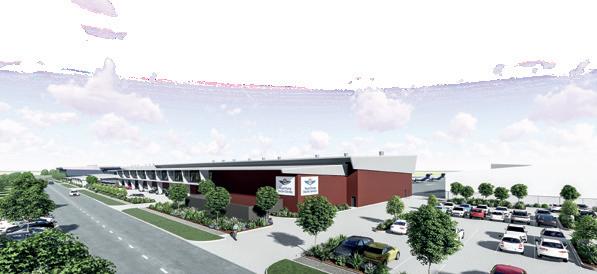
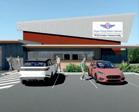
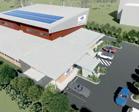
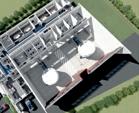


Due for completion in 2024, the custom-built Mount Isa Base will include four dedicated hangar bays, improved maintenance and patient transfer facilities.
In October 2021, the Australian Government approved a $9.7 million grant for this redevelopment through the Building Better Regions Fund. In October 2022, the Queensland Government announced an additional $6.9 million in funding under the Resource Community Infrastructure Fund. Thanks to the community and corporate partners who have supported a fundraising campaign, launched in 2021, to fund the remainder of the build and fit-out of the new Mount Isa Base. Most notably, thanks to The North Australian Pastoral Company (NAPCo) who committed funding as the Mount Isa Base Founding Supporter.
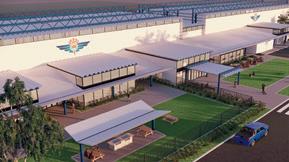
Through the Australian Government’s Hinkler Deal, RFDS received $15 million to develop a world-class aeromedical retrieval simulation training facility on a site adjacent to our Bundaberg Base, with the land donated by Bundaberg Regional Council. Ground was broken on the new site in November 2022, with completion expected by the end of 2023.
Supported by a $3 million donation from QCoal Foundation the new facility will include a full motion flight simulator – the first of its kind in Australia – which will train our pilots to be proficient in the new Beechcraft King Air B360s set to join the RFDS fleet over the coming two years.

Thanks to a funding commitment from the Australian Government, the RFDS continues to progress a new Townsville Base that is estimated to be about four times the size of the existing space. The land deal is expected to be finalised in 2023.
As well as supporting 2,000 local patients a year, the larger Townsville Base will accommodate greater education facilities, more staff-rest accommodation, expanded engineering operations and upgraded patient transfer areas.
SUPPORTER
| IAN AND LESLEY MERRITT, LONGREACH
When Ian moved from Brisbane to the small town of Jundah in 1977, he had no idea he would still call regional Queensland home 45 years later.
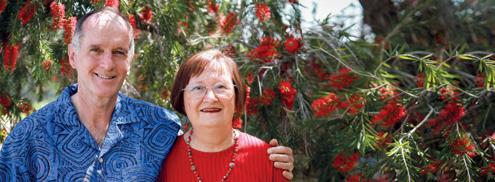
With a population of just more than 100, it took almost no time at all for Ian to fall in love with the small town charm of Jundah.
He was just 21 years of age, when he traded city living in Brisbane to teach at a regional Queensland primary school. It was here where Ian first learnt about the Royal Flying Doctor Service (Queensland Section). The Flying Doctor, renowned by the Jundah community as the lifeblood of regional living, was the beneficiary of a community event.
While Ian only spent a short stint in Jundah, his love for rural Queensland grew, moving to Blackall to teach before settling in Longreach, which has remained his home for 36 years.
After retiring from a long-standing career in education in 2015, Ian has immersed himself into the local community. He is currently the Company Secretary for the Australian Age of Dinosaurs in Winton, has volunteered his administrative talents to local
Living near the airport, Ian and his wife Lesley often lay awake at night hearing the sound of the Flying Doctor arriving to support another community member in need.
ambulance committees and show societies, and provides caretaking duties on farms and properties across the Longreach area.
Ian has also supported the RFDS (Queensland Section) for more than 28 years. To date, his generous contributions have hit almost $20,000. Ian truly understands what it means to give back to the local community.
When looking back at what encouraged him to support the RFDS, Ian said it was during his first moments as a teacher in Jundah. Coming from a capital city, he was accustomed to having easy access to health services, learning quickly how vulnerable those in isolated areas were without this basic right.
It wasn’t until later in life that Ian experienced the Flying Doctor services for himself. In 2014, Ian recognised a need to speak with a counsellor after feeling symptoms of depression. He remembers walking into the local doctor clinic run by the RFDS and was met with
an astounding level of support. After 12 months of counselling, he felt equipped to tackle the world again on his own.
More recently, Ian’s wife Lesley fell ill and the RFDS transferred her from Longreach to Rockhampton.
Lesley describes the crew that helped her as “kind, warm and highly supportive”. It’s these experiences that remind Ian of why he has supported the Flying Doctor for all this time.
Living near the airport, Ian and his wife Lesley often lay awake at night hearing the sound of the Flying Doctor arriving to support another community member in need. For each flight he hears, he feels grateful that his beloved town of Longreach, and all remote areas of Queensland, can rely on the Flying Doctor to keep them healthy and safe.
Ian’s support of the Flying Doctor continues to grow year after year, and he has left a gift in his Will to help the RFDS continue to save lives in regional, rural, and remote parts of Queensland.
It is with great sadness that the Royal Flying Doctor Service bids farewell to former Cairns Chief Pilot, Nick Watling.
Nick passed away peacefully at Cairns Private Hospital on Saturday, 22 October 2022 at the age of 96 years.
Over an 18-year career with RFDS, Nick’s contribution to the Flying Doctor is distinguished and he is remembered by colleagues as ‘a real gentleman’ and a great friend.
A child of World War Two, his fascination for aircraft was born at a young age. In fact, there are reports he was able to name aircraft from silhouette observations, even as a child.
Nick first joined the Flying Doctor on 1 July 1979 and retired on 4 July 1997. He came to the RFDS after 10 years as a pilot with the Queensland Ambulance Transport Brigade and 14 years with the Royal Australian Air Force (RAAF), including service in Vietnam as a squadron leader.
Originally hailing from Sydney, it was a burgeoning career as a sugar chemist that saw Nick relocate north. It didn’t take long for his larrikin side to take to life in Far North Queensland. He loved the tropics, the people and the laid-back lifestyle. He also loved planes – and it was here that a few low-level flying P-51 Mustangs drew him into RAAF and changed his path forever.
In recognition of his military service, Nick was awarded the Distinguished Flying Cross and for his contribution to the Aerial Ambulance and RFDS, he was also honoured with the Medal of the Order of Australia (OAM) in 1998.
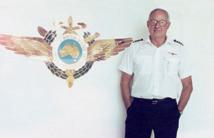
“Nick was well respected by the whole RFDS team but most of all, we enjoyed his company. He was a good friend and he will be very fondly remembered, but equally missed.”
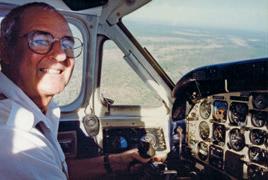
Former RFDS Cairns Base Manager, Mike Lacey, worked alongside Nick Watling for eight of Nick’s neartwo decade tenure and says Nick made many lifelong friends at the Flying Doctor.
“Nick was well respected by the whole RFDS team but most of all, we enjoyed his company. He was a good friend and he will be very fondly remembered, but equally missed.”
Professionally, along with his service delivery, Nick is credited by the RFDS for being instrumental in the formal development of training and checking protocols in conjunction with the Civil Aviation Authority.
RFDS (Queensland Section) CEO Meredith Staib, on behalf of the organisation, shares sincere appreciation for Nick’s dedication.
“I wish to thank Nick for his incredible service to the RFDS over many years, and pass on my condolences to Nick’s family and his colleagues who will be feeling this loss greatly.”
Vale Nick Watling OAM. A great pilot and a great man.
Royal Flying Doctor Service (Queensland Section) acknowledges our strong working relationships with other health service providers. These partnerships are integral in providing the finest care to the furthest corner. Working with key health partners in the communities ensures the Flying Doctor can provide quality aeromedical retrieval services, as well as essential primary and preventative healthcare to regional, rural, and remote communities.
“During 2021/22 South West Hospital and Health Service (SWHHS) and RFDS have collaborated closely to ensure quality retrieval services to our communities. We have explored options to share workforce in times of workforce crisis. Keeping our communities safe and providing quality healthcare is our prime shared mission.”
Dr Anthony Brown, Health Service Chief Executive Officer, South West Hospital and Health Service
“Torres and Cape Hospital and Health Service is proud to work with the RFDS. Along with their provision of primary health care and air retrieval, their assistance with our COVID-19 vaccination rollout ensured we could deliver healthcare to our communities by the right people with the right skills at the right time. I look forward to continuing our partnership in 2022-2023.”
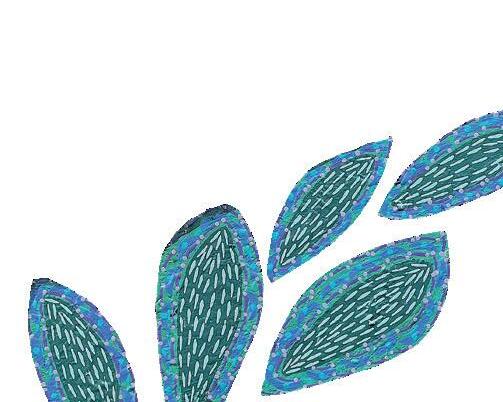
Beverley Hamerton, Health Service Chief Executive, Torres and Cape Hospital and Health Service
“In the past year, the collaboration between RFDS and Northern Queensland Primary Health Network (NQPHN) has strengthened. We have funded RFDS to deliver three key programs to the Northern Queensland community. The Mental Health and Wellbeing (MHWB) Program has increased the availability and accessibility to mental health services for people living in Cape York. The RFDS After Hours Services now provides telehealth consultations with general practitioners seven days a week with the support of nurses and other allied health professionals. headspace Cairns continues to deliver a free and welcoming safe space for young people aged between 12 and 25 providing access, support, and information for a broad range of concerns, including mental health, physical/sexual health, drug and alcohol, employment and education and support for families and carers. In the year ahead we look forward to continuing to work with RFDS (Queensland Section) in delivering outcomes for the rural and remote communities and young people who use these services.”
Robin Whyte, Chief Executive Officer, Northern Queensland Primary Health Network
Royal Flying Doctor Service (Queensland Section) is able to provide the finest care to the furthest corner thanks to our passionate and committed partners.
Principal Partners

Major Corporate Supporters

Corporate Supporters

Community Partners

Government Partners
Major Trust & Foundation Supporters
Mazda Foundation
James Frizelle Charitable Foundation
RP Medical Fund
Baxter Charitable Foundation
Australian Philanthropic Foundation
Thankful Foundation Australia
The generosity of individuals, community groups, business and the corporate sector help fund the emergency aeromedical retrievals and primary health care services across Queensland.
Your support ensures the Flying Doctor is there whenever someone needs it – with more than 240 occasions of care every day across regional, rural, and remote Queensland. Whether someone is on a remote outback station, in a regional city, or travelling anywhere in the state, the Flying Doctor is there to provide the finest care to the furthest corner.
The money donated to the RFDS helps to:
> buy vital medical equipment
> purchase and fit-out aircraft
> develop and deliver a range of outback and rural health programs
Please donate today:
> Mail to 12 Casuarina Street, Brisbane Airport QLD 4008
> Call us on 1300 669 569
> Visit our website www.flyingdoctor.org.au/qld
RFDSQld @RFDSQld @RFDSQld
Royal Flying Doctor Service of Australia
Rescue Swag – an RFDS first aid kit
The profits from all sales go back to RFDS (Queensland Section).
> Visit www.rescueswag.com.au
@RescueSwag @RescueSwag
Brisbane Base
12 Casuarina Street
Brisbane Airport QLD 4008
T 07 3860 1100
F 07 3860 1122
E rfds_bne@rfdsqld.com.au
Bundaberg Base
Aeromedical Hangar 20 Aviation Crescent
Kensington QLD 4670
T 07 4131 3000
F 07 4155 2372
E rfds_bdb@rfdsqld.com.au
Cairns Base
Royal Flying Doctor Street
General Aviation
Cairns Airport QLD 4870
T 07 4040 0444
F 07 4040 0199
E rfds_cns@rfdsqld.com.au
Charleville Base
John Flynn Way
Charleville QLD 4470
T 07 4654 1233
F 07 4654 1629
E rfds_cvl@rfdsqld.com.au
Longreach Base
137 B and C Eagle Street
Longreach QLD 4730
T 07 4652 5800
F 07 4652 5899
E rfds_lng@rfdsqld.com.au
Mount Isa Base
11 Barkly Highway
Mount Isa QLD 4825
T 07 4743 2800
F 07 4743 0521
E rfds_mtisa@rfdsqld.com.au
Royal Flying Doctor Service acknowledges the Australian Aboriginal and Torres Strait Islander peoples as the first inhabitants of the nation and the traditional custodians of the this land. The RFDS is committed to eliminating all forms of discrimination in the provision of healthcare. We embrace diversity and welcome all people irrespective of faith, ethnicity, sexual orientation or gender identity.
Rockhampton Base
Hangar 5, Aviation Drive
Rockhampton QLD 4700
T 07 4921 2221
F 07 4921 2277
E rfds_rok@rfdsqld.com.au
Roma Base
RFDS Hangar
Roma Airport QLD 4055
T 07 4624 4500
F 07 4624 4504
E rfds_roma@rfdsqld.com.au
Townsville Base
Hangar 117
Corner Gypsy Moth Court and Viscount Drive
Townsville Airport QLD 4810
T 07 4775 3111
F 07 4775 3511
E rfds_tsv@rfdsqld.com.au


